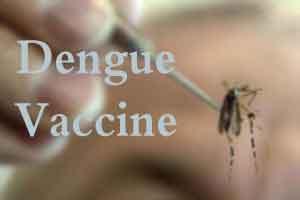- Home
- Editorial
- News
- Practice Guidelines
- Anesthesiology Guidelines
- Cancer Guidelines
- Cardiac Sciences Guidelines
- Critical Care Guidelines
- Dentistry Guidelines
- Dermatology Guidelines
- Diabetes and Endo Guidelines
- Diagnostics Guidelines
- ENT Guidelines
- Featured Practice Guidelines
- Gastroenterology Guidelines
- Geriatrics Guidelines
- Medicine Guidelines
- Nephrology Guidelines
- Neurosciences Guidelines
- Obs and Gynae Guidelines
- Ophthalmology Guidelines
- Orthopaedics Guidelines
- Paediatrics Guidelines
- Psychiatry Guidelines
- Pulmonology Guidelines
- Radiology Guidelines
- Surgery Guidelines
- Urology Guidelines
Novel Dengue vaccine shows 80 percent efficacy in massive trial

Delhi: Takeda vaccine TAK-003 -- a tetravalent dengue vaccine candidate -- is safe and effective against symptomatic dengue in countries in which the disease is endemic, finds a recent study. The vaccine, however, failed to protect against one type of the virus in people with no prior exposure to dengue.
According to the TIDES study, published in the New England Journal of Medicine, the vaccine was 80.2% effective at preventing dengue among children and teens in the year after they got the shot.
WHO defines dengue as a mosquito-borne viral infection causing severe flu-like illness and, sometimes causing a potentially lethal complication called severe dengue. It is a fast emerging pandemic-prone viral disease in many parts of the world. Dengue flourishes in urban poor areas, suburbs and the countryside but also affects more affluent neighbourhoods in tropical and subtropical countries. The disease was designated a WHO top 10 threat to global health in 2019.
Shibadas Biswal, From Takeda Vaccines, Singapore, and colleagues presented primary efficacy data from part 1 of an ongoing phase 3 randomized trial of a tetravalent dengue vaccine candidate (TAK-003) in regions of Asia and Latin America in which the disease is endemic.
For the study, children and adolescents aged 4 to 16 years were randomly assigned in a ratio 2:1 to receive two doses of vaccine or placebo 3 months apart. The participants were tested for virologically confirmed dengue by a serotype-specific reverse-transcriptase polymerase chain reaction. The primary endpoint was overall vaccine efficacy in preventing virologically confirmed dengue caused by any dengue virus serotype.
Of the 20,071 participants who were given at least one dose of vaccine or placebo (safety population), 19,021 (94.8%) received both injections and were included in the per-protocol analysis.
Read Also: New tetravalent dengue vaccine looks promising in Phase 3 Trial
Key findings of the study include:
- The overall vaccine efficacy in the safety population was 80.9% (78 cases per 13,380 [0.5 per 100 person-years] in the vaccine group vs. 199 cases per 6687 [2.5 per 100 person-years] in the placebo group).
- In the per-protocol analyses, vaccine efficacy was 80.2% (61 cases of virologically confirmed dengue in the vaccine group vs. 149 cases in the placebo group), with 95.4% efficacy against dengue leading to hospitalization (5 hospitalizations in the vaccine group vs. 53 hospitalizations in the placebo group).
- Planned exploratory analyses involving the 27.7% of the per-protocol population that was seronegative at baseline showed vaccine efficacy of 74.9% (20 cases of virologically confirmed dengue in the vaccine group vs. 39 cases in the placebo group).
- Efficacy trends varied according to serotype.
- The incidence of serious adverse events was similar in the vaccine group and placebo group (3.1% and 3.8%, respectively).
Read Also: Low serum iron may help dengue virus grow and flourish, finds recent study
More Information: "Efficacy of a Tetravalent Dengue Vaccine in Healthy Children and Adolescents" published in the NEJM journal.
DOI: 10.1056/NEJMoa1903869
Journal Information: New England Journal of Medicine

Disclaimer: This site is primarily intended for healthcare professionals. Any content/information on this website does not replace the advice of medical and/or health professionals and should not be construed as medical/diagnostic advice/endorsement or prescription. Use of this site is subject to our terms of use, privacy policy, advertisement policy. © 2020 Minerva Medical Treatment Pvt Ltd